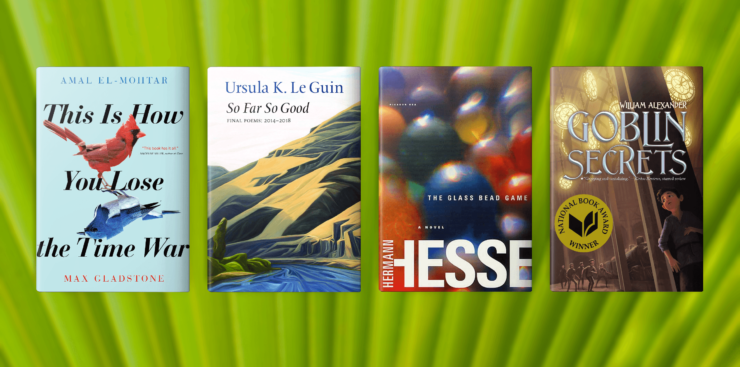The first week of August I was in Florence, then I was in Wales seeing family, then came Worldcon, a trip to Edinburgh for the Fringe, more theatre in London, and back to Florence right at the end. A busy month travelling with friends, so I only read 8 books. I saw lots of amazing plays, though!
Begin Again, Ursula Orange, 1936.
A well-written funny mainstream novel on the subject of how nice middle-class English girls are happier staying at home or marrying than pursuing careers. Very strange to read at this point, because the attitudes are so bizarre as to be quaint and not even annoying, it’s like reading somebody arguing that sail is better than steam when the ship has not only sailed but is halfway to Alpha Centauri.
Twentieth Century Journey, William L. Shirer, 1986.
Shirer was an American journalist who reported for the Chicago Tribune and then CBS from Paris in the twenties and Berlin in the thirties. Then he went back to the U.S. and was a victim of McCarthyism. This is his three-volume autobiography, stretching from 1904 to 1985. I’d read the middle volume before when researching the Small Change books, but not the first or the third. Taken together, it is a fascinating account of a life, across eras, with perspective and an interesting companion. This is very long but absolutely worth it.
This Is How You Lose the Time War, Amal El-Mohtar and Max Gladstone, 2019.
Delightful epistolary novella, lots of fun, with some wonderful moments. I liked it a lot, but I wasn’t quite as blown away by it as some of my friends seem to have been. Not sure whether it’s it or me—maybe it didn’t lend itself well to being read in snatches, and maybe I missed something, but the transition between enemies and lovers seemed to go by awfully fast.
So Far So Good, Ursula K. Le Guin, 2019.
Poetry collection, really lovely meditation on aging and the world. She finished copyediting it just days before she died. Reading it was sad, but also affirming.
Harvard Classics: The New Atlantis, Francis Bacon, 1909.
A trip to Utopia in which people come to an island that is a technological scholarly utopia, originally published in 1626. Enjoyable but extremely weird. It’s promoting experimental science on the assumption that this is a new idea to the reader—and indeed it was, this was Bacon’s contribution. But it’s odd to read it now, as science fiction.
The Glass Bead Game, Hermann Hesse, 1943.
Homework for a Worldcon panel on the retro Hugos, the only nominee I hadn’t previously read. What a weird, weird book! It’s very long, and it’s definitely SF, but it’s about the place of scholarship in civilization and it’s completely wrong in my opinion about what that is. I bounced off this when I was a teenager because it starts with an incredibly boring section explaining the future history. No SF reader needs this. Skip it and begin where it introduces Joseph Knecht. I wish I had. After that it begins to be weirdly fascinating. So, it’s about a culture that values elite education above all else, and a weird abstract game that plays variations on themes with ideas as you might with a musical phrase—that’s what the glass bead game is. Knecht is good at it, and this follows his life and education in detail, and he comes to believe that it’s ultimately sterile. It’s exquisitely written and observed, but very odd, and almost entirely lacking in women—who are, for unexamined reasons, excluded from the education system. It’s a great book but I’ll probably never read it again; my spirits sink at the very idea. (It did not win, but many people consider a Nobel Prize to be even better than a Hugo.)
Maddy Again, Pamela Brown, 1956.
Re-read, but I hadn’t read it in forty years. The last of the Blue Door books, which are children’s books about young people becoming involved in theatre. Maddy, the youngest, is at theatre school in London by herself and becomes a host for a TV program. If you want details on how TV studios worked at the tech level and specific moment of 1956, this would be a terrific source. I’m much less interested in TV than live theatre, and also I remembered the plot, so I enjoyed this less than the others. Indeed, I think my advice with this series would be that if you like Noel Streatfeild, read it up to Golden Pavements and don’t bother with these last two. But how restful it was to read after the effort of Glass Bead Game!
Goblin Secrets, William Alexander, 2012.
Another terrific middle grade novel by newly discovered William Alexander. My thought process reading this was “Clockpunk city, nice, Fagin situation, nice, OMG theatre is banned and a goblin troupe are putting on a play? I LOVE this.” I continued to love it all the way to the end, and am looking forward to the sequel.
Jo Walton is a science fiction and fantasy writer. She’s published two collections of Tor.com pieces, three poetry collections, a short story collection and thirteen novels, including the Hugo- and Nebula-winning Among Others. Her fourteenth novel, Lent, was published by Tor on May 28th 2019. She reads a lot, and blogs about it here irregularly. She comes from Wales but lives in Montreal. She plans to live to be 99 and write a book every year.










